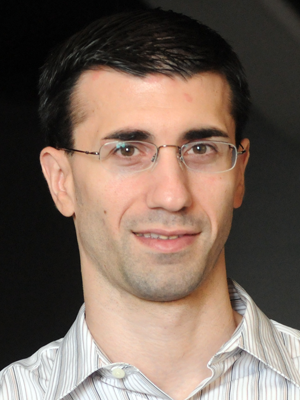New MSE Faculty: Chris Marianetti
 Prof. Chris A. Marianetti joined the faculty in July 2008 from Lawrence Livermore National Laboratory (LLNL) where he was a post-doctoral researcher. The research focus of Prof. Marianetti is the use of many-body quantum theory and computation to predict the behavior of materials. Since the invention of quantum mechanics in the 1920's, it has been a dream of scientists to predict the behavior of materials without input from experiment. In the early days, great progress was made with increasingly clever mathematical theories, and eventually a robust framework for the qualitative understanding of simple materials was in place. However, qualitatively understanding complex elements (ie. transition metal and actinides) or obtaining quantitative accuracy even in simple systems remained elusive. The advent of the computer with its ever increasing speed fundamentally changed the equation, allowing us to solve the many-particle Schrodinger equation with increasing realism and accuracy. Marianetti heavily utilizes both density functional theory (DFT) and the dynamical mean-field theory (DMFT), which are two prominent theoretical approaches for solving the many-body Schrodinger equation. Applying these theories to complex materials requires computational power which ranges from a typical desktop to the worlds largest supercomputers. The beauty of these computational techniques is that they can be applied throughout the periodic table without discrimination, from bulk materials to nanoparticles to interfaces.
Prof. Chris A. Marianetti joined the faculty in July 2008 from Lawrence Livermore National Laboratory (LLNL) where he was a post-doctoral researcher. The research focus of Prof. Marianetti is the use of many-body quantum theory and computation to predict the behavior of materials. Since the invention of quantum mechanics in the 1920's, it has been a dream of scientists to predict the behavior of materials without input from experiment. In the early days, great progress was made with increasingly clever mathematical theories, and eventually a robust framework for the qualitative understanding of simple materials was in place. However, qualitatively understanding complex elements (ie. transition metal and actinides) or obtaining quantitative accuracy even in simple systems remained elusive. The advent of the computer with its ever increasing speed fundamentally changed the equation, allowing us to solve the many-particle Schrodinger equation with increasing realism and accuracy. Marianetti heavily utilizes both density functional theory (DFT) and the dynamical mean-field theory (DMFT), which are two prominent theoretical approaches for solving the many-body Schrodinger equation. Applying these theories to complex materials requires computational power which ranges from a typical desktop to the worlds largest supercomputers. The beauty of these computational techniques is that they can be applied throughout the periodic table without discrimination, from bulk materials to nanoparticles to interfaces.
The applications of Marianetti's research program are broad in scope, ranging from cobalt oxides used in rechargeable Li batteries to plutonium. The underlying theme of the materials application is understanding the physics of materials with applications in energy storage and conversion. Alternative energy is the defining issue of our time, and understanding the underlying materials behavior of these diverse technologies will be critical to advancement. Marianetti's appointment as a visiting scientist at LLNL allows him access to some of the most powerful supercomputers, a necessity for computing the properties of complex materials such as plutonium. The most recent paper of Prof. Marianetti, published in Physical Review Letters, details the first prediction of the temperature dependence of the magnetic properties of plutonium. Understanding these basic properties of Plutonium is relevant to maintaining the safe storage of our nuclear stockpile and nuclear fuels.
Marianetti's background is quite diverse, spanning both experiment and theory, yielding a natural fit in APAM. He earned his B.S. in the field of Welding Engineering at The Ohio State University. During this time, he also spent one year at the General Motors Technical Center working on robotic resistance welding. Marianetti continued along this path, earning a M.S. in Welding Engineering at The Ohio State University. His M.S. thesis research dealt with weld-metal hydrogen assisted cracking, a chronic problem in many high-strength steel weldments. Marianetti then moved in a different direction, earning a PhD in computational Materials Science and Engineering at the Massachusetts Institute of Technology. His PhD thesis research focussed on applying first-principles methods, such as DFT and DMFT, to energy storage materials. Marianetti continued on to a post-doctoral position in condensed matter physics at Rutgers University. There he continued developing/applying DFT and DMFT to strongly correlated electron systems. Following Rutgers, Marianetti moved on to a second post-doctoral position at LLNL where he utilized LLNL's world-class supercomputers to apply DFT and DMFT to Plutonium.
The ability to understand and predict the behavior of materials using first-principles computations will continue to play an increasingly important role in overcoming societies technological challenges. APAM is an ideal department in which to advance this great tradition.
